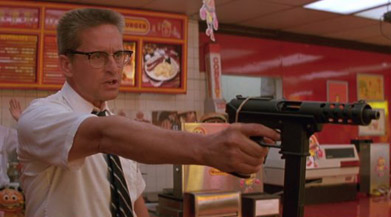|
|
Viking Night: Falling DownBy Bruce HallJune 13, 2012
But it's excessive to the point where it needlessly dilutes the story. Foster already has an interesting back story. Trying to also make him the standard bearer for anyone who hates sitting in traffic trivializes him. Still, Falling Down struck a chord with the media when it came out, prompting a breathless national dialogue about the plight of the middle class white male and America's vanishing Anglo-Saxon hegemony. Really? Are you kidding me? Are we watching the same film? William Foster is a victim all right, but he's a victim of the same economic and political forces that affect millions of people every time there's a recession. But this isn't really explored until the end of the film. The rest of the time we're led to believe that banks are evil because they don't give loans to nice guys, all homeless people are lying bastards and that fast food restaurants are cruel because they don't have pancake batter ready at two in the afternoon. It's a smorgasbord of pointless discourse that goes nowhere. But what saves Falling Down - and I mean this because I do like the movie - is Michael Douglas and Robert Duvall. In the hands of lesser actors their roles might have come across as lurid or laughable. But you buy into them, and when Foster's Big Reveal comes at the beginning of the third act - when he finally admits the truth about himself TO himself - you feel for him (a little). Prendergast fares less well, but Duvall's avuncular charm makes you believe in him anyway, just like you did when it was Danny Glover's last day on the job. The movie is a relic, to be sure. It belongs in a vault somewhere along with black jeans, Steve Urkel, Spice Girls, and everything else we left behind in the Flannel Decade. But you always find something in a time capsule that makes you pause, reflect, and wonder how our ancestors survived without the modern luxuries we enjoy today. Falling Down is a fun trip to the past, and I don't mind the visit. I'm just glad we've all moved on.
|

|
|
|

|
Friday, November 1, 2024
© 2024 Box Office Prophets, a division of One Of Us, Inc.


